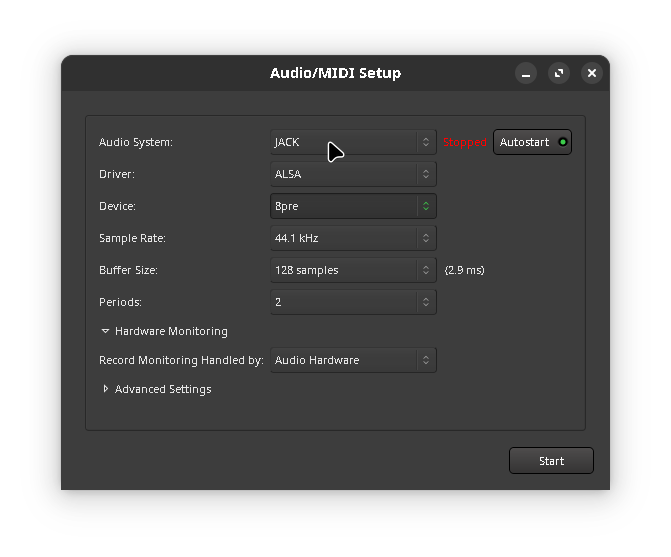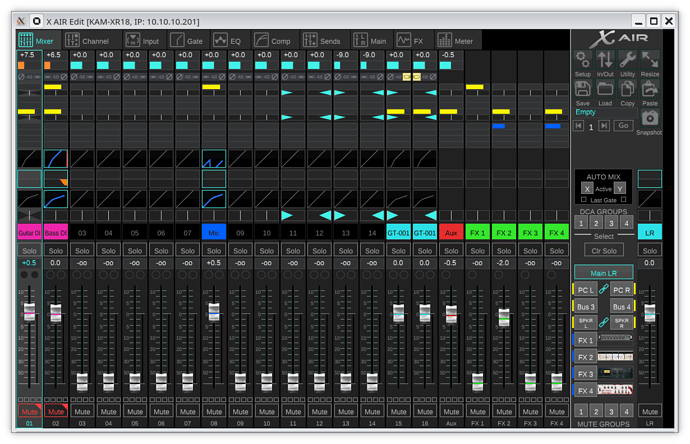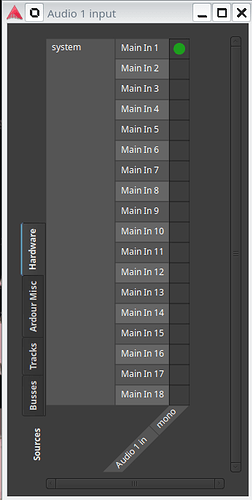Hey y’all,
Long time sandbagger since at least 2015 when I used Ardour to record from my moto 8 pre sometime in 2012 on a laptop and later in 2015 on a desktop.
I’m back because I’ve found myself needing additional inputs. I happen to own and have been using this Yamaha board for a few years now to do live mixing and sound at a local art collective for free for a few years to give back to my community, and keep an accessible venue going.
The Yamaha O1V 96 v2 is supposed to have 8 in/out (@24b/48k) via the USB 2.0 port. I’ve got it plugged into a USB 2.0 port on my PC. I’ve gone into the remote tab on the DIO/SETUP screen and changed the target to General DAW, on the midi/host setup page under “special functions” I have the DAW setup to USB 1-2 and the ‘Remote’ confirms that I have General DAW selected.
With it plugged in I am unable to see it in the ALSA selection / recording setup screen. (the screenshot was unable to see the dropdown menu, but I can assure you it’s not listed in the selections available for me to choose. I see 8pre, 2x intel HDA and 4x nvidia HDA inputs, no USB/Yamaha.
~ aplay -l ✔
**** List of PLAYBACK Hardware Devices ****
card 0: PCH [HDA Intel PCH], device 0: ALC1150 Analog [ALC1150 Analog]
Subdevices: 1/1
Subdevice #0: subdevice #0
card 0: PCH [HDA Intel PCH], device 1: ALC1150 Digital [ALC1150 Digital]
Subdevices: 1/1
Subdevice #0: subdevice #0
card 1: NVidia [HDA NVidia], device 3: HDMI 0 [LG IPS FULLHD]
Subdevices: 1/1
Subdevice #0: subdevice #0
card 1: NVidia [HDA NVidia], device 7: HDMI 1 [HDMI 1]
Subdevices: 1/1
Subdevice #0: subdevice #0
card 1: NVidia [HDA NVidia], device 8: HDMI 2 [HDMI 2]
Subdevices: 1/1
Subdevice #0: subdevice #0
card 1: NVidia [HDA NVidia], device 9: HDMI 3 [HDMI 3]
Subdevices: 1/1
Subdevice #0: subdevice #0
card 3: D8pre [8pre], device 0: FW-MOTU [8pre]
Subdevices: 1/1
Subdevice #0: subdevice #0
The ALC1150 I’m pretty sure is my onboard soundcard, the Nvdia is the RTX 3060 Ti and the moto 8pre is listed, but not the Yamaha. Strangely, I’m able to see it in the ALSA information script.
I also tried following this link which was the closest I could find to my problem YAMAHA 01V96 version2 used to control Ardour. - #8 by eddie3000 - but changing it to ‘User Defined’ did not result in it being listed in the ‘aplay -l’ command, even after restarting JACK.
Is there something special I have to do / am missing to get it to connect?
Thanks: additional helpful information below
inxi -F ✔
System:
Host: karen-main-game Kernel: 6.6.7-1-rt18-MANJARO arch: x86_64 bits: 64
Desktop: GNOME v: 45.2 Distro: Manjaro Linux
Machine:
Type: Desktop Mobo: ASRock model: X99 Taichi serial: <superuser required>
UEFI: American Megatrends v: P1.80 date: 04/06/2018
CPU:
Info: 6-core model: Intel Core i7-6850K bits: 64 type: MT MCP cache:
L2: 1.5 MiB
Speed (MHz): avg: 2861 min/max: 1200/4000 cores: 1: 1298 2: 1363 3: 4000
4: 4000 5: 4000 6: 1200 7: 4000 8: 2904 9: 2371 10: 4000 11: 4000 12: 1197
Graphics:
Device-1: NVIDIA GA104 [GeForce RTX 3060 Ti Lite Hash Rate] driver: nvidia
v: 545.29.06
Display: x11 server: X.org v: 1.21.1.10 with: Xwayland v: 23.2.3 driver:
X: loaded: nvidia gpu: nvidia resolution: 1920x1080~60Hz
API: EGL v: 1.5 drivers: kms_swrast,nvidia,swrast
platforms: gbm,x11,surfaceless,device
API: OpenGL v: 4.6.0 compat-v: 4.5 vendor: nvidia mesa v: 545.29.06
renderer: NVIDIA GeForce RTX 3060 Ti/PCIe/SSE2
API: Vulkan v: 1.3.274 drivers: nvidia,llvmpipe surfaces: xcb,xlib
Audio:
Device-1: Intel C610/X99 series HD Audio driver: snd_hda_intel
Device-2: NVIDIA GA104 High Definition Audio driver: snd_hda_intel
Device-3: Yamaha 01V96 driver: snd-usb-audio type: USB
API: ALSA v: k6.6.7-1-rt18-MANJARO status: kernel-api
Server-1: PulseAudio v: 16.1 status: active
Network:
Device-1: Intel Ethernet I218-V driver: e1000e
IF: enp0s25 state: up speed: 1000 Mbps duplex: full mac:
Device-2: Intel I211 Gigabit Network driver: igb
IF: enp7s0 state: down mac:
Device-3: Intel Wireless 3160 driver: iwlwifi
IF: wlp8s0 state: down mac:
IF-ID-1: docker0 state: down mac:
Bluetooth:
Device-1: Intel Bluetooth wireless interface driver: btusb type: USB
Report: rfkill ID: hci0 rfk-id: 1 state: down bt-service: enabled,running
rfk-block: hardware: no software: yes
Drives:
Local Storage: total: 13.64 TiB used: 6.3 TiB (46.2%)
ID-1: /dev/nvme0n1 vendor: Crucial model: CT1000P1SSD8 size: 931.51 GiB
ID-2: /dev/sda vendor: Seagate model: ST10000DM005-3AW101 size: 9.1 TiB
ID-3: /dev/sdb vendor: Micron model: CT4000X8SSD9 size: 3.64 TiB type: USB
Partition:
ID-1: / size: 915.53 GiB used: 629.51 GiB (68.8%) fs: ext4
dev: /dev/nvme0n1p2
ID-2: /boot/efi size: 299.4 MiB used: 288 KiB (0.1%) fs: vfat
dev: /dev/nvme0n1p1
Swap:
Alert: No swap data was found.
Sensors:
System Temperatures: cpu: 24.0 C mobo: 28.0 C
Fan Speeds (rpm): fan-1: 2376 fan-2: 881 fan-3: 1586 fan-4: 0 fan-5: 0
fan-6: 0
Info:
Processes: 433 Uptime: 12h 27m Memory: total: 32 GiB available: 31.27 GiB
used: 5.99 GiB (19.2%) Shell: Zsh inxi: 3.3.31
!!ALSA Version
!!------------
Driver version: k6.6.7-1-rt18-MANJARO
Library version: 1.2.10
Utilities version: 1.2.10
!!Loaded ALSA modules
!!-------------------
snd_hda_intel (card 0)
snd_hda_intel (card 1)
snd_usb_audio (card 2)
snd_firewire_motu (card 3)
!!Sound Servers on this system
!!----------------------------
PipeWire:
Installed - Yes (/usr/bin/pipewire)
Running - Yes
Pulseaudio:
Installed - Yes (/usr/bin/pulseaudio)
Running - Yes
Jack:
Installed - Yes (/usr/bin/jackd)
Running - No
Jack2:
Installed - Yes (/usr/bin/jackdbus)
Running - Yes
!!Soundcards recognised by ALSA
!!-----------------------------
0 [PCH ]: HDA-Intel - HDA Intel PCH
HDA Intel PCH at 0xfb730000 irq 67
1 [NVidia ]: HDA-Intel - HDA NVidia
HDA NVidia at 0xfb080000 irq 68
2 [D01V96 ]: USB-Audio - 01V96
Yamaha 01V96 at usb-0000:00:14.0-14, full speed
3 [D8pre ]: FW-MOTU - 8pre
MOTU 8pre (version:103800), GUID 0001f200000a54e6 at fw1.0, S400
!!PCI Soundcards installed in the system
!!--------------------------------------
00:1b.0 Audio device [0403]: Intel Corporation C610/X99 series chipset HD Audio Controller [8086:8d20] (rev 05)
Subsystem: ASRock Incorporation C610/X99 series chipset HD Audio Controller [1849:1151]
05:00.1 Audio device [0403]: NVIDIA Corporation GA104 High Definition Audio Controller [10de:228b] (rev a1)
Subsystem: Dell GA104 High Definition Audio Controller [1028:c976]
!!USB Descriptors
!!---------------
--startcollapse--
Bus 003 Device 004: ID 0499:5008 Yamaha Corp. 01V96
Device Descriptor:
bLength 18
bDescriptorType 1
bcdUSB 1.10
bDeviceClass 0 [unknown]
bDeviceSubClass 0 [unknown]
bDeviceProtocol 0
bMaxPacketSize0 8
idVendor 0x0499 Yamaha Corp.
idProduct 0x5008 01V96
bcdDevice 1.01
iManufacturer 1 YAMAHA Corporation
iProduct 2 YAMAHA 01V96
iSerial 0
bNumConfigurations 1
Configuration Descriptor:
bLength 9
bDescriptorType 2
wTotalLength 0x009f
bNumInterfaces 1
bConfigurationValue 1
iConfiguration 0
bmAttributes 0x40
(Missing must-be-set bit!)
Self Powered
MaxPower 0mA
Interface Descriptor:
bLength 9
bDescriptorType 4
bInterfaceNumber 0
bAlternateSetting 0
bNumEndpoints 2
bInterfaceClass 255 Vendor Specific Class
bInterfaceSubClass 0 [unknown]
bInterfaceProtocol 255
iInterface 0
** UNRECOGNIZED: 07 24 01 00 01 8d 00
** UNRECOGNIZED: 06 24 02 02 01 00
** UNRECOGNIZED: 06 24 02 02 02 00
** UNRECOGNIZED: 06 24 02 02 03 00
** UNRECOGNIZED: 06 24 02 02 04 00
** UNRECOGNIZED: 06 24 02 02 05 00
** UNRECOGNIZED: 06 24 02 02 06 00
** UNRECOGNIZED: 06 24 02 02 07 00
** UNRECOGNIZED: 06 24 02 02 08 00
** UNRECOGNIZED: 09 24 03 02 01 01 01 01 00
** UNRECOGNIZED: 09 24 03 02 02 01 01 01 00
** UNRECOGNIZED: 09 24 03 02 03 01 01 01 00
** UNRECOGNIZED: 09 24 03 02 04 01 01 01 00
** UNRECOGNIZED: 09 24 03 02 05 01 01 01 00
** UNRECOGNIZED: 09 24 03 02 06 01 01 01 00
** UNRECOGNIZED: 09 24 03 02 07 01 01 01 00
** UNRECOGNIZED: 09 24 03 02 08 01 01 01 00
Endpoint Descriptor:
bLength 7
bDescriptorType 5
bEndpointAddress 0x01 EP 1 OUT
bmAttributes 2
Transfer Type Bulk
Synch Type None
Usage Type Data
wMaxPacketSize 0x0040 1x 64 bytes
bInterval 1
Endpoint Descriptor:
bLength 7
bDescriptorType 5
bEndpointAddress 0x81 EP 1 IN
bmAttributes 2
Transfer Type Bulk
Synch Type None
Usage Type Data
wMaxPacketSize 0x0040 1x 64 bytes
bInterval 1
--endcollapse--


